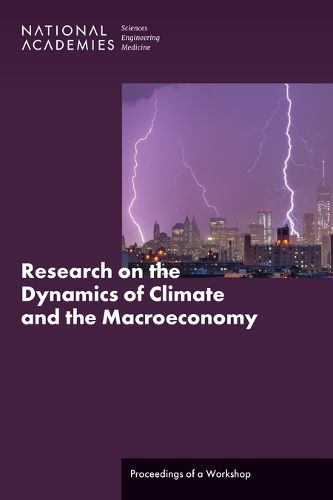Readings Newsletter
Become a Readings Member to make your shopping experience even easier.
Sign in or sign up for free!
You’re not far away from qualifying for FREE standard shipping within Australia
You’ve qualified for FREE standard shipping within Australia
The cart is loading…






Understanding the intricate relationship between climate dynamics and the macroeconomy is crucial for informed policy and long-term planning. However, there is a gap between climate modeling and the understanding of its full macroeconomic effects, partly due to challenges such as nonlinear climate dynamics, feedback loops, and model complexity. To address this, the National Academies of Sciences, Engineering, and Medicine, under the auspices of the Roundtable on Macroeconomics and Climate-Related Risks and Opportunities, convened a workshop on November 1-2, 2023, to consider the state of knowledge on cascading, compounding, and nonlinear physical climate risks and their implications for the macroeconomy. Through panels of invited speakers and interactive breakout discussions, the workshop focused on physical climate risks and explored how different disciplines assess and model impacts. Workshop discussions explored current and historical examples of shocks to the macroeconomy and how those have been modeled, and experts shared some of the lessons they have learned that may be relevant to policy makers today.
Table of Contents
Front Matter Overview 1 Introduction 2 Nonlinear, Cascading, and Compounding Risks in the Climate 3 Nonlinear, Cascading, and Compounding Risks in the Economy 4 Capacity Building and Collaboration 5 Past and Contemporary Lessons in Macroeconomic Shocks and Risks 6 Perspectives on Future Directions 7 Examples of Research Agenda Components 8 Concluding Thoughts References Appendix A Workshop Agenda Appendix B Statement of Task Appendix C Planning Committee Biographies
$9.00 standard shipping within Australia
FREE standard shipping within Australia for orders over $100.00
Express & International shipping calculated at checkout
Stock availability can be subject to change without notice. We recommend calling the shop or contacting our online team to check availability of low stock items. Please see our Shopping Online page for more details.
Understanding the intricate relationship between climate dynamics and the macroeconomy is crucial for informed policy and long-term planning. However, there is a gap between climate modeling and the understanding of its full macroeconomic effects, partly due to challenges such as nonlinear climate dynamics, feedback loops, and model complexity. To address this, the National Academies of Sciences, Engineering, and Medicine, under the auspices of the Roundtable on Macroeconomics and Climate-Related Risks and Opportunities, convened a workshop on November 1-2, 2023, to consider the state of knowledge on cascading, compounding, and nonlinear physical climate risks and their implications for the macroeconomy. Through panels of invited speakers and interactive breakout discussions, the workshop focused on physical climate risks and explored how different disciplines assess and model impacts. Workshop discussions explored current and historical examples of shocks to the macroeconomy and how those have been modeled, and experts shared some of the lessons they have learned that may be relevant to policy makers today.
Table of Contents
Front Matter Overview 1 Introduction 2 Nonlinear, Cascading, and Compounding Risks in the Climate 3 Nonlinear, Cascading, and Compounding Risks in the Economy 4 Capacity Building and Collaboration 5 Past and Contemporary Lessons in Macroeconomic Shocks and Risks 6 Perspectives on Future Directions 7 Examples of Research Agenda Components 8 Concluding Thoughts References Appendix A Workshop Agenda Appendix B Statement of Task Appendix C Planning Committee Biographies